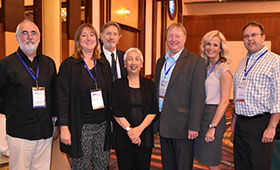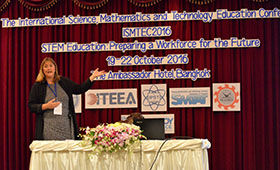The German perspective in international demand
Keynote speech by Birgit Thomann at the 2016 ISMTEC in Thailand
From 19 to 22 October, educational experts gathered for the 2016 International Science, Mathematics and Technology Education Conference (ISMTEC) in Bangkok, Thailand. The theme of this year’s event was “Preparing a Workforce for the Future”. Birgit Thomann, Head of the “Internationalisation of Vocational Education and Training/Knowledge Management” Department at the Federal Institute for Vocational Education and Training (BIBB), delivered a keynote speech in which she provided an insight into opportunities and prospects in technical occupational fields in Germany.

Occupations which focus on science, technology, engineering and mathematics (referred to in abbreviated form as “STEM” occupations) form the basis of German industry. The overall economic significance of this sector is illustrated by a current OECD study, which reveals that above average numbers of school leavers in Germany enter training or higher education study in a technical field. Nevertheless, and despite good career opportunities and attractive salaries, many companies have problems in recruiting suitable young workers.
Against this background, Birgit Thomann explained the relevance of MINT skills for Germany as an educational, economic and scientific location. She stated that one of the major challenges was still to maintain international competitiveness by securing a supply of young skilled workers. Whereas staff requirements in the academic environment are largely covered, a different picture emerges in respect of the traditional training occupations. Alongside breaking down the general image problems from which technical occupations suffer, Birgit Thomann believes that a further major task will be to inspire important target groups to pursue MINT occupations and to attract larger numbers of young women in particular. Although political initiatives such as the annual “Girls’ Day” were showing initial success, they were still not completely tapping into the available potential. Well-established work experience placements during secondary schooling were also an important instrument for providing young people with initial experiences in this occupational area.
Birgit Thomann concluded her presentation by forecasting the role vocational training would play in an increasingly digitalised society. Whilst digitalisation was exerting an effect on virtually all occupational fields, bringing about change within these fields and demonstrating the necessity for new or expanded competences, a high degree of significance was also being accorded to advanced training and to training for teaching and training staff in particular.
